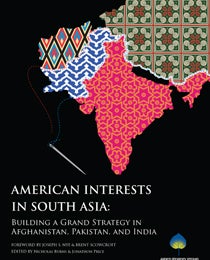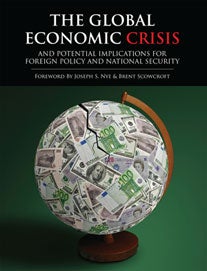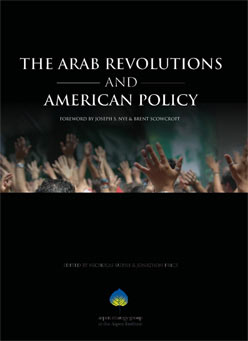The Struggle for Power: U.S.-China Relations in the 21st Century
January 24, 2020 • Aspen Strategy Group
The Aspen Strategy Group released The Struggle for Power: U.S.-China Relations in the 21st Century bringing together preeminent experts to explore how to compete effectively with the military and technological rise of China and how to engage U.S. allies amidst this great-power rivalry.
Authors include: Graham Allison, Robert D. Blackwill, Nicholas Burns, Kurt Campbell, Elizabeth Economy, Joseph P. Federici, Kathleen H. Hicks, Anja Manuel, Shivshankar Menon, Joseph S. Nye, Jr., Michael Pillsbury, Mira Rapp-Hooper, Ely Ratner, Condoleezza Rice, David E. Sanger, David Shambaugh, Pavneet Singh, and James B. Steinberg.
Technology and National Security: Maintaining America’s Edge
February 7, 2019 • Aspen Strategy Group
The Aspen Strategy Group released Technology and National Security: Maintaining America’s Edge bringing together preeminent experts to examine the current era of transformative technological change, its disruptive effects on America’s instruments of power, and the path ahead as the U.S. seeks to maintain its primacy.
Authors include Edward Alden, Nicholas Burns, Ash Carter, Jack Clark, Jared Cohen, John Deutch, John Dowdy, Diana Farrell, Walter Isaacson, Chandru Krishnamurthy, Katherine Mansted, Jason Matheny, Joseph S. Nye, Jr., Penny Pritzker, Condoleezza Rice, Eric Rosenbach, and Laura Rosenberger.
The World Turned Upside Down: Maintaining American Leadership in a Dangerous Age
November 16, 2017 • Aspen Strategy Group
In 2017, the Aspen Strategy Group examined the future of the liberal world order. The papers in this volume outline the history and importance the system of institutions and normative values that have underpinned the international system since the end of WWII. They also highlight some of the key threats to this order that have emerged over the past several years and endeavor to provide practical recommendations for meeting these challenges.
On December 11, 2017 the Aspen Strategy Group hosted the publication event for this book at DLA Piper’s Washington D.C. office. Several prominent figures in national security, many of whom contributed chapters to the book, spoke at the event.
America’s National Security Architecture: Rebuilding the Foundation
November 29, 2016 • Aspen Strategy Group
In August 2016, the Aspen Strategy Group examined how to reform America’s national security decision-making process. The papers in this volume provide practical solutions to repair the key functions of Washington’s executive departments, agencies, and advisory bodies responsible for shaping U.S. foreign policy and national security.
Blind Spot: America’s Response to Radicalism in the Middle East
December 15, 2015 • Aspen Strategy Group
This book is a collection of papers commissioned for the 2015 Aspen Strategy Group Summer Workshop. In response to the evolving challenges extremist groups present in the Middle East, more than 70 leaders in academia, business, government, and journalism convened in Aspen, Colorado, in August 2015, to analyze the implications of radicalism in the Middle East. The book begins by exploring the roots and appeal of extremism in the Arab world, discusses the future of the Islamic State of Iraq and Syria (ISIS), and outlines strategies to counter ISIS and the threat of Islamic extremism in general. The essays that make up this book capture a range of opinions on the roots, drivers, and sustainability of radical groups in the Middle East.
The Crisis with Russia
November 19, 2014 • Aspen Strategy Group
This book is a collection of papers commissioned for the 2014 Aspen Strategy Group Summer Workshop. On the occasion of the 30th year anniversary of the Aspen Strategy Group (founded in 1984), the Summer Workshop in Aspen, CO convened a nonpartisan group of preeminent U.S.-Russia policy experts, academics, journalists, and business leaders. The Group’s policy discussions were guided by the papers found in this volume, whose scope ranges from exploring the history of the U.S.-Russia relationship, current developments in the Sino-Russian relationship, the NATO and European responses to Russian aggression in Eastern Europe, energy considerations, areas of potential U.S.-Russia cooperation, and finally, the broader question of U.S. national security and interests in the European region.
The Future of American Defense
February 4, 2014 • Nicholas Burns and Jonathon Price
With the American withdrawal from Iraq and the imminent drawdown of the majority of American and NATO ground forces from Afghanistan, the U.S. is bringing to a close the longest and most intensive period of combat in our history. Coupled with the challenges of the budget crisis and political dysfunction in Washington, D.C., this is also a time of tough and consequential choices for the defense budget. This volume includes the principal essays and policy papers prepared for the Aspen Strategy Group’s discussions in Aspen. We hope they will help readers here in the U.S. and around the world reflect on the hard choices and difficult trade-offs we must make in the years ahead to maintain the quality and effectiveness of the U.S. military.
The Arab Revolutions and American Policy
March 29, 2013 • Nicholas Burns and Jonathon Price
This book is a collection of papers commissioned for the 2012 Aspen Strategy Group Summer Workshop. The papers evaluate the various drivers and outcomes of the Arab revolutions, all of which continue to bear an ever-greater influence on the formulation of American strategy in the Middle East. Authors examine the critical period of transition in Egypt, escalating violence and options of intervention in Syria, the threats associated with a nuclear Iran, balancing an effective strategy of immediate economic assistance and long-term investment in the region, and the Obama administration’s successes and failures during the overall process of democratization.
Securing Cyberspace: A New Domain for National Security

February 21, 2012 • Nicholas Burns and Jonathon Price
This book is a collection of papers commissioned for the 2011 Aspen Strategy Group summer workshop. The papers examine the complexities of the emerging cyber threat, as well as the possibilities – and inherent challenges – of crafting effective domestic and international cyber policy. Authors explore topics such as the economic impact of cybercrime, cyber as a new dimension of warfare, the revolutionary potential of Internet freedom, and the future realities the United States will face in the new age of heightened Internet connectivity.
American Interests in South Asia: Building a Grand Strategy in Afghanistan, Pakistan, and India

March 11, 2011 • Nicholas Burns and Jonathon Price
This book contains a collection of commissioned papers that provide an intensive exploration of the interconnected national security challenges posed by the events in Afghanistan, Pakistan, and India. Chapters focus on the lessons from history and balance of power in the region, the current strategy in Afghanistan, the effect of American foreign assistance and private sector development, and the implications for the U.S. of India-Pakistan relations. Together, these chapters seek to further collective understanding of the current issues facing the region and help policymakers find a way to cope with what has become one of America’s most pressing security problems.
The Global Economic Crisis and Potential Implications for Foreign Policy and National Security

December 11, 2009 • Aspen Strategy Group
With the generous support of the Gates Foundation, the Markle Foundation, and many others, the ASG devoted its annual summer conference to discussing the foreign policy and national security implications of a deep financial turmoil. During its sessions, the ASG explored the strategic consequences of the global economic crisis, and considered how dramatically changing economic and financial foundations might impact the foreign policy agenda of both the United States and other countries on the international scene.
 The Instruments & Institutions of American Purpose
The Instruments & Institutions of American Purpose

April 1, 2009 • Kurt Campbell and Jonathon Price
This book is a collection of papers prepared for the 2008 summer Aspen Strategy Group conference on The Instruments & Institutions of American Purpose. These chapters represent a thorough accounting of the capabilities and limitations of the key organizations—diplomatic, military, financial, and intelligence—that American policymakers rely upon to address global challenges.
The Global Politics of Energy

April 1, 2008 • Institute Contributor & Aspen Strategy Group
This book presents a high-level examination of policy strategies for addressing the challenges posed by the soaring demand for oil, the rise of petro-powers, and the implications of climate change.








